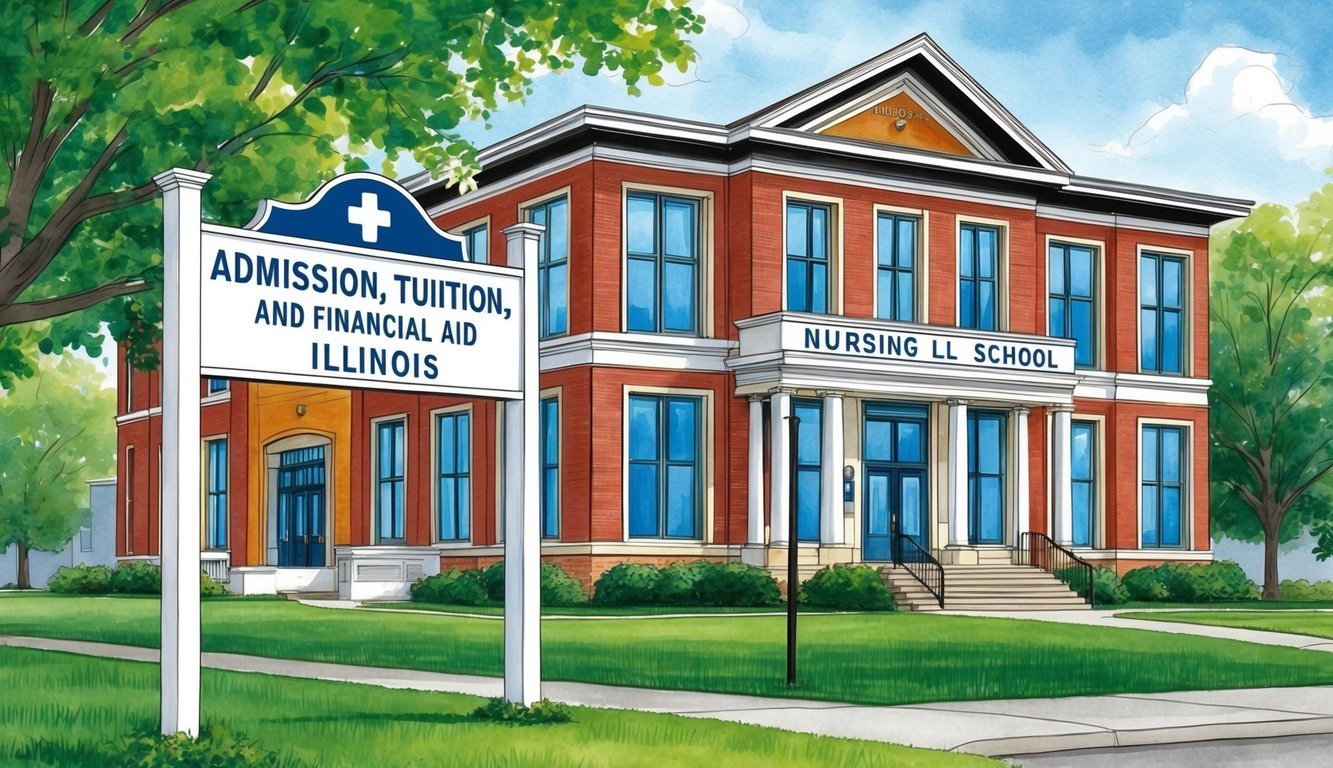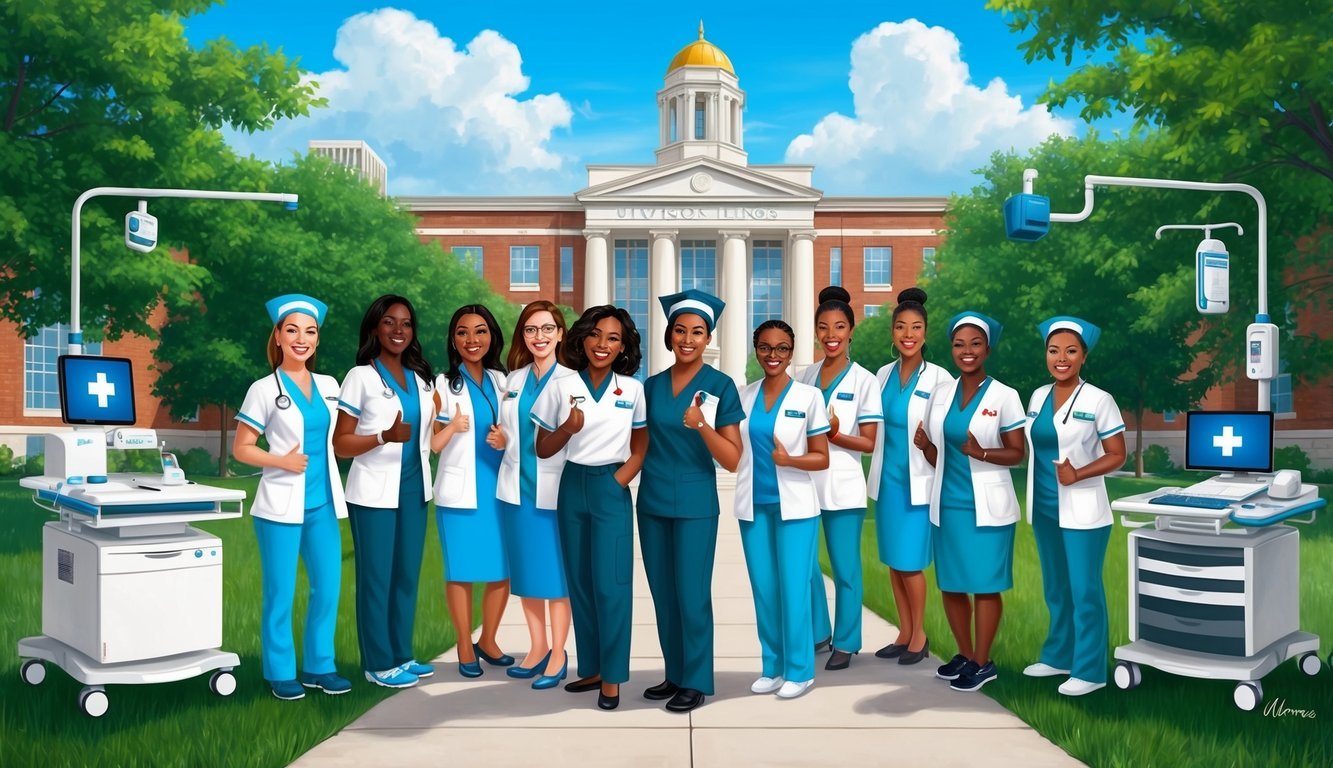If you’re considering a career in healthcare, exploring nursing schools in Illinois can be your first step towards a fulfilling profession. Illinois offers a variety of accredited programs that cater to aspiring nurses.
You can find programs for an Associate Degree in Nursing (ADN) or a Bachelor of Science in Nursing (BSN). These programs are designed to provide you with the necessary skills and knowledge to succeed in different nursing roles.
Nursing education in Illinois combines classroom learning with hands-on clinical experience, equipping you to face real-world challenges in the healthcare environment.
Many schools, such as Saint Xavier University, have been recognized as centers of excellence, ensuring you receive a high-quality education.
Additionally, programs often offer scholarships to help mitigate the cost of your training.
As you embark on this journey, be sure to consider various factors including program reputation, clinical opportunities, and financial aid options.
Understanding these elements will help you make an informed decision that aligns with your career aspirations in nursing.
Overview of Nursing Education in Illinois
Nursing education in Illinois provides various pathways to becoming a registered nurse, including options for those seeking a Bachelor of Science in Nursing (BSN) and an Associate Degree in Nursing (ADN).
Understanding these programs is essential for making informed decisions about your nursing career.
Nursing Degrees and Programs
In Illinois, aspiring nurses can choose from several educational programs tailored to meet different career goals.
Common degrees include:
-
Bachelor of Science in Nursing (BSN): This is typically a four-year program that includes in-depth coursework and clinical experience. Many hospitals prefer hiring BSN graduates for their comprehensive training and leadership skills.
-
Associate Degree in Nursing (ADN): This is a two-year program focusing on foundational nursing skills. This path allows you to enter the workforce quickly.
-
RN to BSN Programs: These programs cater to registered nurses who wish to advance their education. They often accommodate working professionals through flexible scheduling.
-
Master of Science in Nursing (MSN) and Doctor of Nursing Practice (DNP) are available for those pursuing advanced roles in nursing, such as nurse practitioners or nurse educators.
Comparing BSN and ADN Paths
Choosing between a BSN and an ADN involves weighing several factors.
| Criteria | BSN | ADN |
|---|---|---|
| Duration | 4 years | 2 years |
| Scope of Practice | Broader, includes leadership roles | Focused on clinical skills |
| Employment Opportunities | Generally higher with more options | Adequate but more limited |
While both degrees qualify you for the National Council Licensure Examination for Registered Nurses (NCLEX-RN), a BSN may offer you greater career advancement opportunities and higher salaries in the long run.
In Illinois, many organizations recognize the importance of a well-prepared nursing workforce.
This is reflected in career opportunities for nurses who have pursued advanced degrees.
For more insights on nursing programs, you can explore Nursing Programs in Illinois.
Top Nursing Schools and Universities

When considering nursing education in Illinois, several institutions stand out for their programs, resources, and support for students.
Below are details about key nursing schools that offer robust training and degree options.
University of Illinois at Chicago
The University of Illinois at Chicago (UIC) is renowned for its College of Nursing which is one of the largest in the nation.
UIC offers a variety of nursing degrees, including BSN, MSN, and DNP programs.
The college emphasizes hands-on experience through various clinical partnerships, allowing you to work in diverse healthcare settings.
UIC also has a strong focus on research, providing opportunities for graduate students to engage in innovative projects.
With diverse pathways to becoming a registered nurse, UIC prepares its students well for the competitive healthcare environment.
Bradley University
Bradley University provides a comprehensive nursing program that emphasizes both clinical practice and theoretical knowledge.
The nursing program at Bradley offers a unique blend of undergraduate and graduate degrees, including a traditional BSN and an accelerated option for those with previous degrees.
Students receive individualized support and access to modern simulation labs, which enhance learning outcomes.
Bradley’s strong partnerships with local hospitals ensure you benefit from hands-on training with professional mentors in real-world settings.
More importantly, Bradley consistently ranks highly among Illinois nursing schools, signifying its commitment to quality education.
Saint Xavier University
At Saint Xavier University, the School of Nursing prides itself on delivering a personalized educational experience.
The institution offers a range of programs including BSN, RN to BSN, and MSN tracks designed to fit various career paths.
Saint Xavier is recognized for its high NCLEX-RN pass rates, reflecting the quality of education provided.
With experienced faculty and a focus on community service, you will engage in practical training that prepares you for future roles in healthcare.
The supportive environment and commitment to student success make Saint Xavier an excellent choice for aspiring nurses.
Mennonite College of Nursing
Mennonite College of Nursing is an integral part of Illinois State University and has been training nurses since 1919.
The college offers Bachelor’s and Master’s degree programs with a holistic approach to nursing education.
Students benefit from a collaborative learning environment and have access to various clinical placements that enhance their practical skills.
Mennonite College focuses on leadership and patient-centered care, ensuring graduates are well-prepared for the nursing profession.
With its long-standing reputation and dedicated faculty, Mennonite College of Nursing stands out among Illinois nursing schools.
Illinois College
Illinois College offers a dynamic nursing program that emphasizes liberal arts education along with nursing training.
The program is designed to develop critical thinking and leadership skills, essential for today’s healthcare landscape.
Illinois College also boasts small class sizes which foster a personalized education experience.
Students can pursue traditional BSN degrees, benefitting from extensive clinical practice opportunities available through partnerships with local healthcare facilities.
This institution prioritizes student wellness and engagement, making it an attractive option for future nurses looking for comprehensive education in a supportive environment.
Admission, Tuition, and Financial Aid

Navigating the admission process, understanding tuition costs, and exploring financial aid options are crucial aspects of attending nursing schools in Illinois.
This section will provide essential insights into acceptance rates, available financial aid resources, and tuition structures to help you make informed decisions.
Understanding Acceptance Rates
Acceptance rates can vary significantly among nursing schools in Illinois.
Generally, competitive programs have lower acceptance rates, reflecting higher demand and limited capacity.
For instance, the University of Illinois Chicago has an acceptance rate of around 50% for its BSN program, while other institutions may accept 60-80% of applicants.
When you apply, ensure that your academic records, letters of recommendation, and personal statements are strong.
Meeting or exceeding the average GPA requirements will increase your chances of acceptance.
Additionally, some schools consider healthcare experience or volunteer work, which can further enhance your application profile.
Financial Aid Options
Various financial aid options are available to nursing students in Illinois.
Here are some key resources:
- Federal Aid: You can apply for federal financial aid through the Free Application for Federal Student Aid (FAFSA). This can grant access to Pell Grants, federal loans, and work-study opportunities.
- State Scholarships: The Nursing Education Scholarship Program offers financial aid for eligible students committed to working in underserved areas.
- Institutional Scholarships: Many nursing schools, such as Lewis University, provide institutional scholarships specifically for nursing students. These awards can significantly offset tuition costs and are based on academic performance and financial need.
Tuition Costs and In-State Tuition
Tuition costs for nursing programs in Illinois vary widely.
On average, you can expect to pay between $20,000 and $40,000 per year for tuition.
Here’s a brief comparison:
| School Name | In-State Tuition | Out-of-State Tuition |
|---|---|---|
| University of Illinois Chicago | $31,000 | $53,000 |
| Lewis University | $30,000 | $30,000 |
| Millikin University | $26,000 | $26,000 |
In-state tuition rates are typically lower, making it more affordable for residents.
Additionally, many schools offer payment plans and extended payment options to help you manage costs effectively.
Be sure to research specific programs and their financial policies to best fit your budget.
Curriculum and Clinical Experience

A comprehensive nursing education in Illinois emphasizes both theoretical knowledge and practical application.
This dual approach prepares you for real-world challenges in nursing practice.
You will engage in core nursing courses, participate in clinical rotations, and gain valuable insights through real-world nursing practice.
Core Nursing Courses
Core nursing courses form the foundation of your education, covering essential topics that equip you with the necessary skills and knowledge.
You will study subjects such as:
- Nursing Fundamentals: Introduction to basic nursing concepts and skills.
- Medical-Surgical Nursing: Focus on adult patients with various health issues.
- Pediatrics and Women’s Health: Specialized care for children and women during different life stages.
- Mental Health Nursing: Addressing psychological and emotional health in patients.
Courses often include interactive learning experiences, fostering critical thinking and decision-making capabilities necessary for effective nursing care.
Programs like the University of Illinois Chicago integrate simulation-based learning to enhance your understanding.
Clinical Rotations
Clinical rotations provide hands-on experience in various healthcare settings.
During these rotations, you will work under the supervision of experienced nurses, applying what you’ve learned in the classroom to real-life situations.
You will rotate through different specialties, including:
- Acute Care
- Community Health
- Pediatric Care
- Mental Health Services
These experiences are crucial for developing your clinical skill set and understanding the dynamics of patient care.
Programs such as those at Saint Anthony College of Nursing emphasize quality clinical placements, ensuring you receive a well-rounded education.
Real-World Nursing Practice
Engaging in real-world nursing practice allows you to apply theoretical knowledge in actual patient care scenarios.
This experience helps build confidence and competence in your nursing skills.
Through partnerships with hospitals and healthcare systems, you will participate in hands-on learning opportunities.
You will focus on:
- Patient Assessment: Learning to evaluate patient needs effectively.
- Care Planning: Developing comprehensive plans tailored to individual patient requirements.
- Collaboration: Working with interdisciplinary teams to ensure holistic patient care.
Experiencing diverse healthcare environments enhances your adaptability and prepares you for future nursing challenges.
Institutions like Kaskaskia College prioritize practical training, ensuring you graduate well-prepared for a career in nursing.
Career Outcomes and Professional Growth

Your journey in nursing is marked by significant opportunities for career outcomes and professional growth.
Understanding the pathways available after graduation can enhance your experience and open doors to new possibilities in the healthcare field.
Passing the NCLEX and Licensure
You must successfully pass the NCLEX-RN, as this is a crucial step for nursing graduates.
This exam tests your knowledge and skills, paving the way for RN licensure.
In Illinois, the NCLEX pass rate varies among institutions, with some schools boasting rates above 90%.
Schools like McHenry County College prepare students well for this challenge.
After passing, you can apply for your license through the Illinois Department of Financial and Professional Regulation (IDFPR), which is essential for practicing as a registered nurse in the state.
Employment in Healthcare Settings
Nursing graduates have access to diverse employment opportunities in various healthcare settings.
From hospitals to clinics, nursing homes, and community health organizations, each environment presents unique challenges and rewards.
The demand for registered nurses in Illinois remains high, with over 129,000 RNs currently employed in the state.
According to recent data, RNs in Illinois earn an average salary of $78,260 annually, which can increase with experience and specialization.
Engaging in roles such as direct care, patient education, and administrative tasks will enhance your professional skills further.
Continued Education and Leadership
Continuing education is vital for career advancement in nursing.
Many RNs pursue higher education such as BSN or MSN degrees.
These can lead to leadership positions and specialized roles.
Options for advanced practice include nurse practitioners, clinical nurse specialists, and nurse educators.
Organizations like the American Nurses Association support your journey through professional development programs.
Additionally, embracing social justice in healthcare promotes equitable access and quality care for all patients.
This positions you as a leader in the nursing community.
By pursuing these avenues, you can influence the future of nursing and contribute to improved healthcare outcomes.

